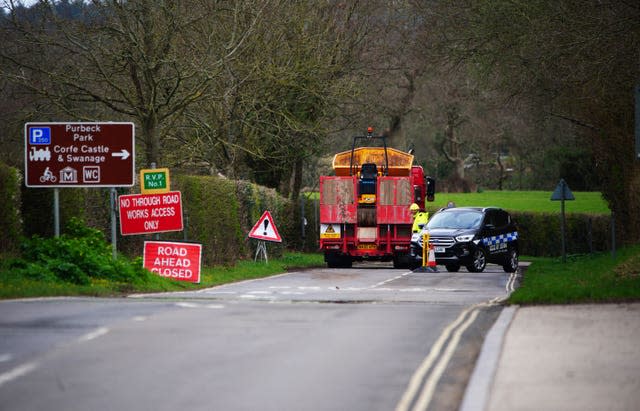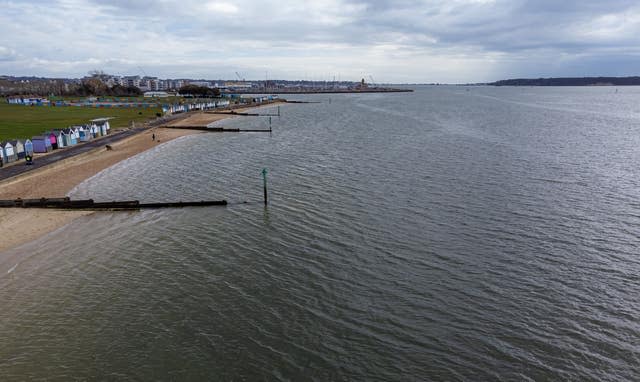Up to 15 birds with oil on feathers spotted since Poole Harbour oil leak

Up to 15 birds have been spotted with oil smudges on their feathers following the oil leak in Poole Harbour, Dorset.
Fears have been raised for the impact on wildlife and habitats following the leak from a pipeline operated by gas company Perenco under Owers Bay on Sunday.
Approximately 200 barrels of reservoir fluid were released after the leak occurred at the Wytch Farm oil field.
Perenco said a “small” amount of reservoir fluid (consisting of 85% water and 15% oil) escaped.

A containment and clean-up operation was launched by Poole Harbour Commissioners (PHC), which regulates activities in the harbour.
The RSPB said that although it has been made aware of birds with oil smudges, their behaviour appears to be “normal” and it was optimistic about the situation.
A spokeswoman said: “We have so far received reports of up to 15 birds in the area with what appears to be brown oil smudges on their feathers, but all seem to be feeding, flying and behaving normally.
“These include black-headed gulls, Mediterranean gulls, shelduck and mute swans.
“However, the only way for them to clean is by preening, and we have yet to see what the impacts of that may be once they digest the substance on their feathers, so we are continuing to monitor the situation closely.
“It’s too early to know the scale of impact but we have been in regular contact with the authorities to support the response as best we can, and we remain cautiously optimistic that it may not be as bad as we first feared.”
The Game and Wildlife Conservation Trust (GWCT) has said it is concerned for migratory fish, particularly young Atlantic salmon (Salmo salar) and sea trout (Salmo trutta), known as smolts, which are at the start of their seabound migration from the rivers Frome and Piddle which flow through Poole Harbour.
Dr Rasmus Lauridsen, GWCT head of fisheries research, said: “This is the worst possible time for migratory salmonids. We are currently catching them in numbers through our smolt trap so we know that they are passing through Poole harbour at the moment.”
Dylan Roberts, head of fisheries at GWCT, said: “During their migration through estuaries, they are at a crucial and highly sensitive stage of their life cycle as their bodies adjust to transferring from living in rivers to sea water.
“We are extremely concerned that these increasingly rare young fish may perish in the polluted waters.”
The PHC said that clean-up operations were under way in a “small” number of areas where the oil had come ashore.
In a statement it said that the authority had received reports of some oiled birds but there had been no known fatalities so far and monitoring was ongoing to assess the impact on the local habitats.
The statement says: “Since the start of the process, 58 km of shoreline has been assessed. We have received over 200 reports from five teams feeding into our Emergency Response Centre. PHC continue to monitor the harbour by helicopter, drones, boat and shore patrols.
“Latest reports show that the oil continues to dissipate, however some oil has come ashore in a small number of areas and PHC is in the process of clearing up these areas as and when recorded.
“There have been a limited number of reports regarding oiled birds, however we are unaware of any bird fatalities at this stage, but we will continue to monitor the situation.
“Water and shellfish sampling is being carried out in Poole Harbour and we continue to monitor any impact on the environment. Key stakeholders in the fishing industry have been contacted.
“As a precaution, the public are advised that they should still avoid using Poole Harbour for recreational purposes – including the hand gathering of shellfish – and continue to avoid bathing at beaches within Poole Harbour until further updates become available.
“Bournemouth, Christchurch and Poole Council has raised signage at Rockley Park, Lake Pier, Hamworthy Park, Baiter Slipway, Whitley Lake (Kite Beach) and the slipway at Lake Road to ask visitors not to swim in these areas until further notice.
“Signage has been put up by Dorset Council along the Studland beaches, Knowle Beach, South Beach, Ferry Road and Shell Bay asking visitors not to not to swim in these areas until further notice.”
Following an urgent question in the Commons on Monday, environment minister Rebecca Pow said that an investigation had been launched into the cause of the incident and to assess the environmental impact.
Environment groups have expressed anger and concern at the risk posed by oil facilities on the UK coast, particularly close to protected wildlife sites.

A small protest was held on Monday afternoon at Poole Quay, with demonstrators unfurling a banner reading: “End fossil filth.”
PHC carried out a survey of the harbour on Monday morning involving 100 people, helicopters and drones.
It said it was working with local authorities to monitor and clean up the spill using the shoreline clean-up and assessment technique.
The authority warned against bathing in the area and said anyone feeling unwell should contact their GP.


